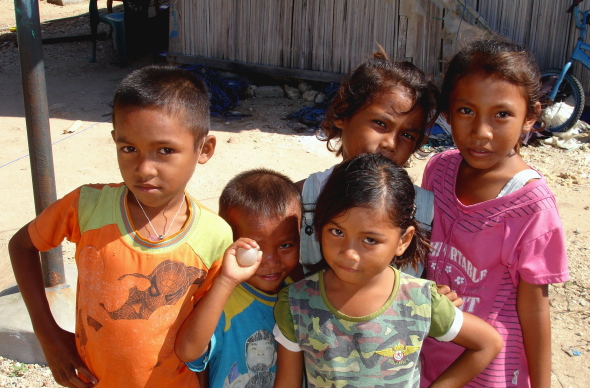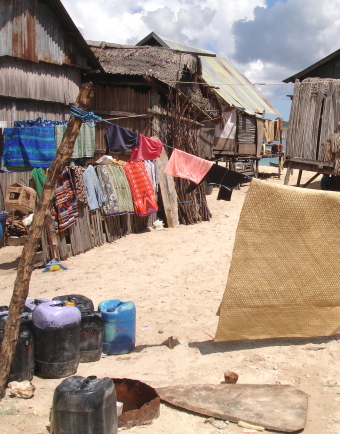Australian maritime law is undermining the livelihoods of Pepela fishermen
Brooke Nolan and Philip Vincent
Life is hard in the fishing village of PepelaBrooke Nolan |
In the village of Pepela in southeast Rote, East Nusa Tenggara, over 80 per cent of the population rely on fishing as their main source of income. But for almost four decades Australian law has caused the Pepela people – indigenous Rotenese, Alorese and many Bajau Laut migrants from Southeast Sulawesi – to encounter significant difficulties continuing their traditional fishing in the Timor Sea. These problems began in 1974 when new sea boundary arrangements were negotiated between Indonesia and Australia in the form of a Memorandum of Understanding (MOU). This resulted in some traditional Indonesian fishing areas coming within the jurisdiction of Australian law. Fishing in some regions was subsequently banned and fishing methods in the remaining regions became strictly regulated.
Since then, many fishermen from Pepela have been apprehended by Australian authorities and imprisoned in Australia for extended periods. The MOU’s prohibition against the use of technology has contributed to the deaths of numerous fishermen during cyclones. Instead of acting as a deterrent against fishing, has simply increased the suffering of an already impoverished population.
The MOU and the Australian Fishing Zone
The MOU, signed by President Suharto and Prime Minister Whitlam in 1974, established that only ‘traditional’ Indonesian fishermen were allowed to fish in the Australian Fishing Zone on the northwest coast of Australia. In the MOU, ‘traditional’ was defined as meaning that fishermen may not use motors or GPS equipment. The agreement identified a ‘MOU Box’ limiting Indonesian traditional fishing to a small area around Ashmore and Scott reefs, Cartier and Browse Islands all off the north-west coast of Western Australia. In 1979, the Australian Fishing Zone (AFZ) was extended to 200 nautical miles from the Australian coast, so that ‘Australian’ waters effectively begin only 80 kilometres from the Indonesian island of Rote. This expansion meant that many of the traditional fishing grounds of Indonesian fishermen were now deemed to be in Australian waters and, as a result, any access to these areas by Indonesian fishermen would be regulated and policed by Australian authorities. The MOU box area within the AFZ does not include all the former traditional fishing areas of the Pepela fishermen, so those who continue to fish in these areas are now considered to be in violation of Australian law.
Then in 1983, in response to concerns raised by the Australian scientific research organisation, the CSIRO, the areas surrounding Ashmore Reef and Cartier Island were designated as the Ashmore Reef National Nature Reserve. The CSIRO argued that Ashmore Reef played an important role in maintaining the biodiversity of the region as it is a breeding area for dugongs, turtles and other species but that many valuable marine species were diminishing or had already disappeared. In an attempt to halt this environmental damage, in 1989 foreign ministers Ali Alatas and Gareth Evans agreed that all fishing and gathering activities in the Ashmore Reef National Nature Reserve would be banned. After this date, Indonesian fishermen were only permitted to undertake ‘traditional’ fishing in other areas of the MOU Box.
In the 1990s, fishing in the region intensified when large numbers of Bajau Laut people began migrating from the Wakatobi Islands in south-east Sulawesi and settling at Tanjung Pasir, on the outskirts of Pepela. Primarily shark fishermen, these men taught local Rotenese how to fish for shark. Dramatic increases in the price of shark fin in the mid-1990s then caused an intensification of both legal and illegal fishing in Australian waters. Reacting to this increase in illegal Indonesian fishing, the Howard government gave the navy permission to shoot at Indonesian vessels for non-compliance with naval orders, a directive which has not yet been rescinded. Apprehended boats are towed to the mainland and fishermen, some of whom are juveniles, spend lengthy periods in detention before being put through the Australian courts. Penalties include imprisonment and the destruction of boats, catch and equipment by Australian authorities.
Families paying the price
What is often ignored in discussions surrounding ‘illegal fishing’ in Australian waters is the traumatic impact of Australian regulations on Indonesian families. The detention of fishermen increases the debts of entire families to boat owners. When fishermen leave Rote, they must borrow from these ‘bosses’ to buy provisions for their families. Captains in Pepela explained that they usually leave their wives and children with Rp.500,000 (A$59) and 50kg of rice for the one or two months they expect to be at sea. Crew members leave their families with between Rp.50,000 - 150,000 (A$6 – 18) and 20 to 50 kilograms of rice forthe same period.
These supplies soon run out if husbands are detained and, in order to survive, wives must sell fish or snack foods or firewood as well as jewellery or other personal items of value. They also farm seaweed, grow onions, beans and other vegetables to sell or borrow money from neighbours or boat owners. Sometimes they are forced to take their children out of school because, although the schooling itself is free, the cost of taking a motorcycle taxi to school and paying for books often becomes unaffordable. In these situations children usually drop out of school between the ages of 10 and 12 years. The boys start working as fishermen and girls stay at home to help with domestic chores. The women we spoke with expressed a strong desire for their children to get a good education, but their meagre economic situation makes this impossible.
Fishing for alternatives
Given the ongoing difficulties that Australian maritime law poses for fishing in the region, the Rotenese needed to expand their efforts beyond simply searching for survival strategies and instead consider alternative industries. Some locals in the region have been busy establishing a more sustainable alternative source of income. In 2001, villagers in So’ao, a twenty-minute boat trip from Pepela, established a seaweed farm as an alternative source of livelihood. The farm involves the use of long submerged ropes with plastic string tying embryonic weeds to the ropes and empty plastic water bottles to act as floats. Locals then use canoes to collect mature weed for sale. The project is well managed, runs at low cost and has allowed most So’ao men to stop fishing in the Timor Sea. This seaweed farm, which was supported by a grant of Rp.27M (A$3200) from the Australian Embassy’s Direct Aid Program, made a profit of Rp.265M (A$31,300) in 2008.
 |
These children’s futures are at stakeBrooke Nolan |
But on 21 August 2009 the viability of seaweed farming was threatened when oil from PTTEP Australasia’s Atlas West rig on the Montara oilfield, leaked oil into the Timor Sea for ten weeks before relief efforts succeeded in stopping the spill. In May 2010, the Montara Commission of Enquiry, set up by the Australian Government, found that up to 90,000 square kilometres in the Timor Sea and beyond was affected by the oil spill. Oil from this leak was found in Indonesian waters as far north as Alor and Flores. An estimated 90 per cent of the seaweed crop from 2009 died. Tests at the University of Indonesia showed that fish and other marine species were also contaminated as a direct result of the spill.
Following the leak, profits from the seaweed farm dropped by about 80 per cent to just over Rp.58 million (A$6850). This economic loss had repercussions for the education, health and standard of living of So’ao families. While the villagers’ children were still enrolled in school, many people reported that they wouldn’t be able to continue paying for their education if the profits from seaweed farming did not pick up again. Despite being aware of the risks to their own welfare and that of their families, men from So’ao claimed they would have no alternative but to return to fishing if seaweed farming remained unprofitable. Efforts to obtain compensation for the fishermen adversely affected by the oil spill are ongoing. The West Timor Care Foundation, based in Kupang, is also requesting assistance from the Australian government in an appeal for AU$17 billion in compensation from PTTEP Australasia.
Sustainability and the MOU
But it is not enough for the Australian government just to support the development of seaweed farming as an alternative source of income for fishermen even if the farm returns to profitability. The MOU agreement does not reflect all the traditional fishing areas of fishermen from Rote and elsewhere and should be revised to acknowledge these. The MOU should also be updated to allow for the adaptation of some more modern fishing methods rather than forcing the use of unsafe and outdated fishing methods to ensure compliance. Other aspects of Australian law, particularly where it is concerned with native title cases, do not hold that ‘traditional’ means ‘frozen in time’. As a matter of safety, Rote fishermen should be allowed to adopt some modern methods, including a small motor, accurate sea charts and GPS to assist in navigation.
Until these changes are implemented and Australia offers more support to fishermen and alternative industries such as the seaweed farmers in Rote, the sustainability of both livelihoods and environment in the region will remain in jeopardy. It is clear that Australia’s current policy, while further impoverishing Rotenese fishermen and their families, is also failing to achieve its stated aim of preventing Indonesian fishing in the region.
Brooke Nolan (borneobrooke@gmail.com) is an Asian Studies student from the University of Western Australia and an Endeavour Award recipient.
Philip Vincent (pvincent@iinet.net.au) is a Perth lawyer who has represented many Indonesian fishermen who have been apprehended by the Australian authorities.












